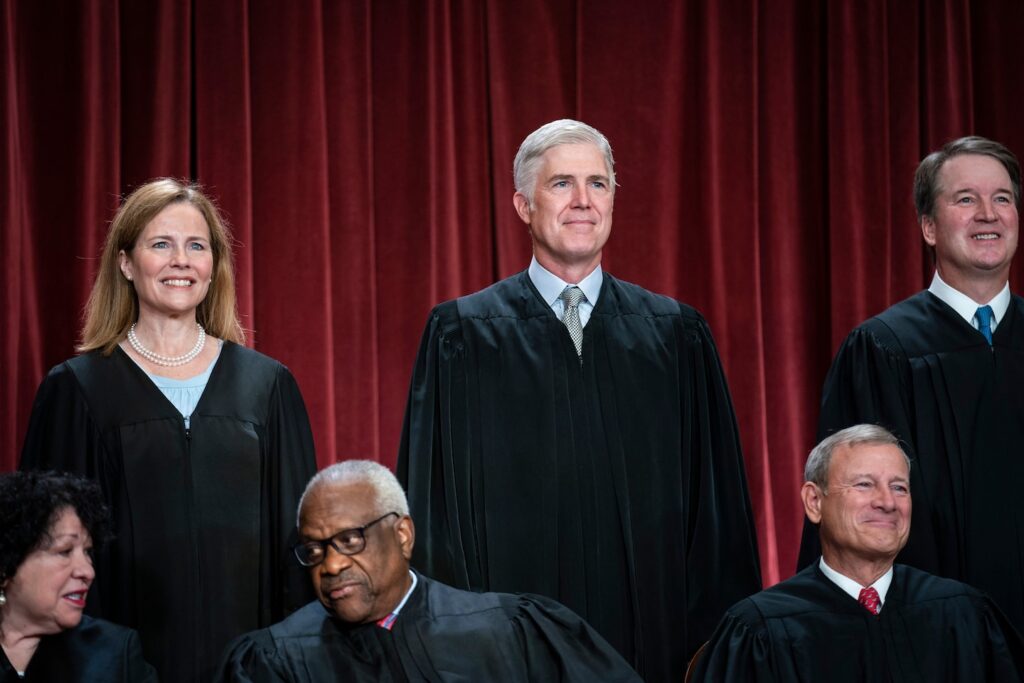Is the Supreme Court's conservative majority plotting to chip away at same-sex marriage rights and other constitutional protections? The liberal justices seem to think so, issuing an ominous warning to that effect in a dissent in a little-known immigration case on Friday.
Department of State v. Muñoz involves Sandra Muñoz, a California woman and U.S. citizen. Her husband, Luis Asencio Cordero, a Salvadoran citizen, wanted to enter the United States to live with his wife and children, who are U.S. citizens. U.S. consulate officials in San Salvador determined that Asencio Cordero was an MS-13 gang member because of his religious tattoos and denied him entry. Asencio Cordero denied being a gang member.
Under U.S. immigration law, foreigners have no right to challenge a visa denial in court, but Munoz argued that her husband's denial of a visa violated her fundamental right to live with her spouse in the U.S., which is part of a right to marry protection that the courts have said is guaranteed by the Constitution.
The court rejected that argument. “Citizens have no fundamental liberty right to the admission of their alien spouses,” Justice Amy Coney Barrett wrote in the majority opinion.
 Follow this author Ruth Marcus' opinion
Follow this author Ruth Marcus' opinion
She said such rights “are not deeply rooted in the history and tradition of this country,” and cited a 1997 case that has served as a touchstone for determining the scope (or, in the case of abortion, limiting) of constitutional rights not specifically written into the text.
You can probably guess why the liberal justices are worried. The first sentence of the dissent, written by Justice Sonia Sotomayor, quotes from Obergefell v. Hodges, the 2015 case that established the right to marry for same-sex couples. This was a 5-4 decision by an entirely different court, and two of the majority members, Justices Anthony M. Kennedy and Ruth Bader Ginsburg, have now been replaced by Justices Brett M. Kavanaugh and Barrett.
Sotomayor argued that the majority could have resolved the case by simply declaring that Muñoz had received all the due process, including an explanation from authorities as to why his visa had been denied. (Justice Neil M. Gorsuch made the same point, concurring in the decision but not joining the majority opinion.)
“That could have been the end of it, and it should have been,” Sotomayor said. “But the majority took a bold decision.” She warned that her approach to the constitutional right to marry was inconsistent with the understanding she outlined in Obergefell and with her assurances that other precedents were not in jeopardy in Dobbs v. Jackson Women's Health Organization, the 2022 decision that struck down constitutional protections for the right to an abortion.
The Dobbs majority denied any intention to review other cases based on unenumerated rights, including Obergefell. (Justice Clarence Thomas would have intended to overturn cases that established protections for married couples to obtain contraception, for same-sex couples to engage in sexual activity, and for same-sex marriage.)
“Although the majority two terms ago assured that the repeal of abortion rights 'would not in any way impair' other established substantive due process rights, such as 'the right to marry,' 'the right to live with relatives,' and 'the right to decide about the education of one's children,' the Supreme Court failed on its first test,” Sotomayor warned.
The most immediate risk, she said, is to same-sex couples, who often cannot safely live together in other countries. But she implied that there is more going on here than that. She said the majority is “making the same fatal error it made in Dobbs” and needs to be “overly cautious” in its description of the asserted “fundamental liberty interests.” This seems like the first blow in the battle over the scope of unenumerated constitutional rights unleashed in Dobbs.
The majority countered that the dissenters were jumping to unwarranted conclusions. Their basic message to liberals was that they should calm down. “To be clear, today's decision does not in any way call into question any of this Court's precedent, including our precedent protecting marriage as a fundamental right,” Justice Barrett wrote in a footnote.
So how scared should we be about threats to same-sex marriage? If this question were first asked today, I don't see how the Supreme Court would reach the same conclusion as in Obergefell and declare a comprehensive new constitutional right. At the same time, and I know, of course, they blithely ignored Dobbs, I don't see how even this Court would try to turn the nation's legal landscape upside down again and eliminate the right to marriage equality.
Yet Justice Barrett and the other conservative justices are clearly not inclined to interpret the Constitution and its unenumerated rights broadly. As Justice Gorsuch and the dissenting party pointed out, they could have avoided the constitutional issue and decided Muñoz on narrower grounds. Instead, they chose to reiterate the importance of limiting constitutional protections to only those “deeply rooted in history and tradition.” Was this a signal? Or an invitation? That the liberal justices are nervous should worry us all.



